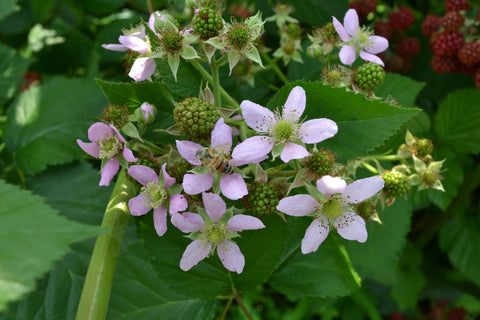The populations of butterflies, native bees, and other insect pollinators have declined for several decades.
Why should that matter to you?
Insects play a vital role in our ecosystem; we cannot survive without them.
By designing a pollinator garden in your yard, you can increase native biodiversity, encourage biological control of “pest” insects, increase pollination of your crops, and beautify your home!
Who pollinates?
- Bees
- Birds
- Bats
- Butterflies
- Beetles
- and more!

No insects? No food! Really!
1 of 3 bites of food you eat depends on pollinators to reproduce!
Insects pollinate about 75% of all flowering plants.
What are native plants?
According to the National Wildlife Federation, “Native plants have formed symbiotic relationships with native wildlife over thousands of years, and therefore offer the most sustainable habitat. A plant is considered native if it has occurred naturally in a particular region, ecosystem, or habitat without human introduction.”
Starting Your Pollinator Garden
It is crucial to choose native plants that support pollinators.
- Select nectar- and pollen-rich flowers native to your region that match site conditions.
- Select plants that allow continuous bloom throughout the growing season to attract pollinators from spring through fall.
- Prioritize diversity; select flowers of various colors, shapes, and sizes.
Planting just one pollinator-friendly plant makes a difference!
A Nontoxic Habitat
Try going pesticide-free!
Pesticides and insecticides severely harm or kill pollinators and damage their reproduction ability.
If you must use a pesticide, reach for the least toxic material possible and carefully read and follow all label directions.
Another benefit of planting native plants is conserving water!
Native plants are adapted to local environmental conditions and require substantially less water than exotic plants.

How Can a Pollinator's Garden help your Nourse Farms crops?
Planting a pollinator strip as a border to your fruit and vegetable crops will improve the pollination of your crops!
In addition to attracting butterflies and bees, a pollinator strip will also attract and support other pollinators, such as hoverflies and wasps, which will help control crop pests.
Questions?
Call Nourse Farms at 413-665-2658 or email us at info@noursefarms.com. We're here to help you grow!



